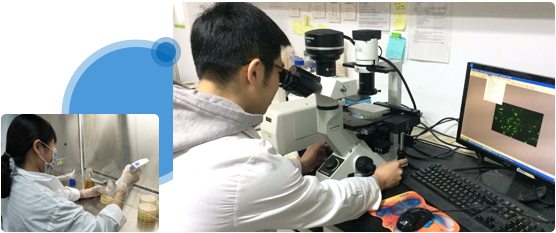The Graduate Institute of Microbiology and Public Health (GIMPH) is a dynamic research center dedicated to microbiology, human health and veterinary medical education in Taiwan. GIMPH is committed to training the students to become specialists capable of using advanced biotechnology and information engineering to meet national and international needs. The Institute aims at knowledge innovation and communicates between industry and education/research organizations via various projects and activities. The focuses of GIMPH include﹕
The Graduate Institute of Microbiology and Public Health (GIMPH) was integrated from the Graduate Institute of Veterinary Microbiology (GIVM) and the Graduate Institute of Public Health (GIVPH). GIVM was established in 1991 while GIVPH was established in 2003. The Ministry of Education formally approved the integration of the two institutes in 2009.

To develop methods for rapid diagnoses of animal diseases
The rapid diagnoses of diseases are crucial for the control of diseases of animals. The GIMPH is devoted to the development of methods for the rapid detection of viruses and bacteria that cause diseases of animals. Recombinant DNA technology and other modern biotechnology play a key role in development of these methods.
To develop novel vaccines for veterinary usage
Vaccination is one of the best methods for controlling diseases of animals. The GIMPH is highly interested in developing novel vaccines for veterinary usage. Recombinant subunit vaccine, gene-deleted vaccine and DNA vaccine have a high priority to be chosen as the types of vaccines developed by GIMPH.
To commercialize bio-products from livestock waste transformation and recycling
The value of using biotechnology to generate high-value products from livestock wastes is well recognized. Therefore, this research goal aims to recycle high value bio-products to ensure environmental quality. The GIMPH is positioned as a platform for exchange and transfer of applied knowledge on sustainable biotechnology. Policy is established to collaborate with industry to commercialize the bio-products into market.
To standardize advanced techniques in the detection of therapeutic and toxic residuals
Therapeutic agents are crucial to the prevention and control of disease in food animals. However, residues are great threats to the safety and nutritional quality of food products for human consumption. The detection and identification of residual molecules through high performance analytical techniques are of great value. The GIMPH will focus on the development of analytical techniques for trace amounts of chemical residuals and natural toxins to assure hygienic slaughter and human nutrition safety.
Surveillance of zoonoses and risk assessment
GIMPH will serve as an informative database for Taiwan government on the occurrence, development and outcome of epidemics throughout the island through coordinated studies devoted to the surveillance and control of commutable diseases common to humans and animals at the national and international level. Timely and accurate diagnosis of epidemics could significantly shorten the course of an outbreak and greatly diminish the damages. GIMPH searchs for new strategies for prevention or treatment of infections by opportunistic micro-organisms.
Reference lab for pathogens and R&D
Reference lab, a simulative environment for disease control studies, provides fundamentals of the role air/vector-borne pathogenic micro-organisms and natural toxins play in an epidemic outbreak. Identification of causative agents and selection of drug/chemical are keys to the effective control of vectors and contagious pathogens. Reference lab is the center block of the disease control system.
Students are trained to understand all phases of scientific writing including data collection, literature review, experimental design, and presentation skills. Independent thinking and development of problem-solving abilities are emphasized.
Proficiency in English is emphasized to strengthen international research collaboration. The participation at world trade organization is putting forward intense demand of global interactions. A good command in English increases competitivity and broadens the student's career prospect.
These fundamental curriculums are combined to equip students with essential knowledge on major disciplines of life sciences: biology, microbiology, virology, immunology, and molecular biology.
Students will learn to use PCR, RT-PCR, ELISA, Western blot, recombinant protein production and other methods as tools for molecular diagnosis and vaccine development.
The principle and application modern analytical techniques (ELISA, EIA, HPLC, CE, PCR) are provided so students are capable of identifying causative agents.
Students will learn to use reference eco-lab for environmental studies, highlighting zoonoses diseases and risk assessment. Researches will also emphasize on the use of biochemical and immunological techniques to facilitate the control process.